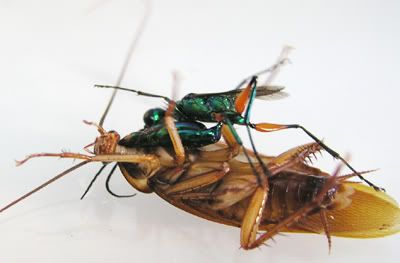
How do you animate me in the morning, pre-coffee? I can think of a number of possible answers, but on this particular Tuesday, a recent Loom post had me wide-eyed and mouth breathing while the coffee was still percolating. Even if you aren't a biology geek like myself, I imagine you'll be mindblown by the alchemical relationship between the American cockroach (Periplaneta americana) and the exoparasitoid wasp (Ampulex compressa). I've highlighted some of the details below in an attempt to whet your appetite for more.
"The wasp slips her stinger through the roach's exoskeleton and directly into its brain....She continues to probe the roach's brain until she reaches one particular spot that appears to control the escape reflex. She injects a second venom that influences these neurons in such a way that the escape reflex disappears.
From the outside, the effect is surreal. The wasp does not paralyze the cockroach. In fact, the roach is able to lift up its front legs again and walk. But now it cannot move of its own accord. The wasp takes hold of one of the roach's antennae and leads it--in the words of Israeli scientists who study Ampulex--like a dog on a leash.
The zombie roach crawls where its master leads, which turns out to be the wasp's burrow."
The horrifying, Borg-like take over of the cockroach's neural wiring is permanent. The wasp lays an egg on the roach's underbelly and, as you would imagine, the larva burrows into the roach and devours the still fresh - um, alive, at least initially - organs when it leaves the egg. After roughly eight days, an adult, sated wasp emerges from the husk of the cockroach...and so the circle of life continues.
Exoparasitoids like Ampulex compressa have been appearing in scientific journals a lot these last few years. Humans have studied proper parasites for centuries now and learned much about them in the process - at least, the ones we have identified - but of exoparasitoids we know comparatively little. Furthermore, they represent a transitional phase of evolution. As Carl Zimmer writes at Loom, "it's not hard to envision an Ampulex-like wasp evolving into full-blown parasitoids that inject their eggs directly into their hosts, as many species do today."
I get very excited by this sort of "discovery," not only because of the grotesque nature of the relationship or because I believe it "proof" of Nature's complete ambivalence, as Darwin did(1), but because it requires of the researcher only admiration, dedication and observation.
Photo credit: Ampulex compressa goes to work on a cockroach; FREDERIC LIBERSAT
(1) "I cannot persuade myself that a beneficent and omnipotent God would have designedly created the Ichneumonidae [wasp] with the express intention of their feeding within the living bodies of caterpillars or that a cat should play with mice."

7 comments:
Love it.
Makes me think of the wonderful scene in Updike's, "Witches of Eastwick" when the devil character delivers a sermon on the glory of parasites at the local Unitarian church.
Praise and Glory!
That is soooo cool. Parasitic life histories often leave me shaking my head, and the "mind control" that seems to be commonly involved is especially fascinating.
That is RAD.
I actually met Fred Liberstat after one of his talks at Harvard last year. This wasp is amazing in that not only does it create the cockroach zombies, which is really cool and just a little bit disturbing, but it finds the right spot to inject the venom using tiny sensory receptors on its stinger. It doesnt stick its stinger through the head at a precise spot, but uses chemical receptors, possibly even neurotransmitter receptors to locate the correct ganglion to inject the venom. Yeah, Im a big nerd, but its cool.
"I cannot persuade myself that a beneficent and omnipotent God would have designedly created the Ichneumonidae [wasp]with the express intention of their feeding within the living bodies of caterpillars" -C.Darwin
-wait a minute, He made 'em, but never said He controls 'em.
from the agnostic front,
Antonio
Art is my Ichneumon wasp.
Michael:
Sounds great...I haven't read the book, and that little anecdote could one day sell a copy.
Carel:
Yup.
Scace:
Big nerds are always cool. Well, big bio nerds, anyway. Fascinating stuff.
Antonio:
Spoken like a typical agnostic! ;)
I kid, I kid. Your point is well taken. but Darwin was considering an omnipotent, omniscient, omnipresent God, as was the characterization then, and, as such, "He" would have been controlling them.
Michael:
Word.
Post a Comment